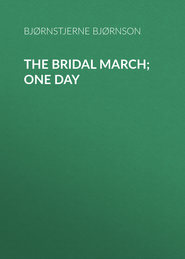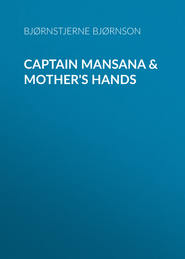По всем вопросам обращайтесь на: info@litportal.ru
(©) 2003-2024.
✖
Arne; Early Tales and Sketches
Настройки чтения
Размер шрифта
Высота строк
Поля
It was some time since she had been to church; she wished to have her mother go, she said, and some one must be at home. One Sunday, later in the summer, the weather was so fine that the hay could well be left out for twenty-four hours, and the mother said that now they surely might both go. Margit could not reasonably object to this, and got ready for church; but when they were so far on their way that they could hear the church-bells, she burst into tears. The mother grew deathly pale: but they went on, the mother in advance, Margit following, listened to the sermon, joined in all the hymns to the very last, followed the prayer, and heard the bell ring before they left. But when they were seated in the family-room at home again, the mother took Margit's face between her hands and said: —
"Hide nothing from me, my child."
There came another winter when Margit did not dance. But Nils the tailor fiddled, took more strong drink than ever, and always, toward the close of the evening, swung the prettiest girl at the party. In those days, it was told as a certain fact that he could marry whom he pleased among the daughters of the first gard-owners in the parish; some added that Eli Böen herself had courted him for her daughter Birgit, who was madly in love with him.
But just at that time an infant of the houseman's daughter at Kampen was brought to baptism; it was christened Arne, and tailor Nils was spoken of as its father.
The evening of the same day Nils was at a large wedding; there he got drunk. He would not play, but danced all the time, and scarcely brooked having others on the floor. But when he crossed to Birgit Böen and asked her to dance, she declined. He gave a short laugh, turned on his heel, and caught hold of the first girl he encountered. She resisted. He looked down; it was a little dark maiden who had been sitting gazing fixedly at him, and who was now pale. Bowing lightly over her, he whispered, —
"Will you not dance with me, Karen?"
She made no reply. He asked once more. Then she answered in a whisper, as he had asked, —
"That dance might go farther than I wished."
He drew slowly back, but once in the middle of the floor, he made a spring and danced the halling[3 - A popular dance in two-fourths time, described in this chapter.] alone. No one else was dancing; the others stood looking on in silence.
Afterwards he went out in the barn, and there he lay down and wept. Margit kept at home with the little boy. She heard about Nils, how he went from dance to dance, and she looked at the child and wept, – looked at him again and was happy. The first thing she taught him was to say papa; but this she dared not do when the mother, or the grandmother, as she was henceforth called, chanced to be near. The result of this was that it was the grandmother whom the boy called papa. It cost Margit much to break him of this, and thus she fostered in him an early shrewdness. He was not very large before he knew that Nils the tailor was his father, and when he reached the age in which the romantic acquires a flavor, he became also aware what sort of a man tailor Nils was. The grandmother had strictly forbidden even the mention of his name; what she mainly strove for was to have the houseman's place, Kampen, become an independent gard, so that her daughter and her boy might be free from care. She availed herself of the gard-owner's poverty, effected the purchase of the place, paid off a portion of the money each year, and managed the business like a man, for she had been a widow for fourteen years. Kampen was a large place, and had been extended until now it fed four cows, sixteen sheep, and a horse in which she was half owner.
Nils the tailor meanwhile took to roving about the parish; his business had fallen off, partly because he felt less interest in it, partly also because he was not liked as before. He gave, therefore, more time to fiddling; this led oftener to drinking and thence to fighting and evil days. There were those who had heard him say he was unhappy.
Arne might have been about six years old, when one winter day he was frolicking in the bed, whose coverlet he had up for a sail, while he was steering with a ladle. The grandmother sat spinning in the room, absorbed in her own thoughts, and nodded occasionally as though she would make a fixed fact of something she was thinking about. The boy knew that he was unheeded, and he fell to singing, just as he had learned it, the rough, wild song about tailor Nils: —
"Unless 'twas only yesterday hither first you came,
You've surely heard already of Nils the tailor's fame.
"Unless 'twas but this morning you came among us first,
You've heard how he knocked over tall Johan Knutson Kirst.
"How, in his famous barn-fight with Ola Stor-Johann,
He said, 'Bring down your porridge when we two fight again.'
"That fighting fellow, Bugge, a famous man was he:
His name was known all over fjord and fell and sea.
"'Now, choose the place, you tailor, where I shall knock you down,
And then I'll spit upon it, and there I'll lay your crown.'
"'Ah, only come so near, I may catch your scent, my man,
Your bragging hurts nobody; don't dream it ever can.'
"The first round was a poor one, and neither man could beat;
But both kept in their places, and steady on their feet.
"The second round, poor Bugge was beaten black and blue.
'Little Bugge, are you tired? It's going hard with you.'
"The third round, Bugge tumbled, and bleeding there he lay.
'Now, Bugge, where's your bragging?' 'Bad luck to me to-day!'"[4 - Translated by Augusta Plesner and S. Rugeley-Powers.]
More the boy did not sing; but there were two other stanzas which his mother was not likely to have taught him: —
"Have you seen a tree cast its shadow on yesterday's snow?
Have you seen how Nils does his smiles on the girls bestow?
"Have you looked at Nils when to dance he just commences?
Come, my girl, you must go; it is too late, when you've lost your senses."
These two stanzas the grandmother knew, and they came all the more distinctly into her mind because they were not sung. She said nothing to the boy; but to the mother she said, "Teach the boy well about your own shame; do not forget the last verses."
Nils the tailor was so broken down by drink that he was no longer the man he had been, and some people thought his end could not be far distant.
It so happened that two American gentlemen were visiting in the parish, and having heard that a wedding was going on in the vicinity, wanted to attend it, that they might learn the customs of the country. Nils was playing there. They gave each a dollar to the fiddler, and asked for a halling; but no one would come forward to dance it, however much it was urged. Several begged Nils himself to dance. "He was best, after all," they said. He refused, but the request became still more urgent, and finally unanimous. This was what he wanted. He gave his fiddle to another player, took off his jacket and cap, and stepped smiling into the middle of the room. He was followed by the same eager attention as of old, and this gave him his old strength. The people crowded closely together, those who were farthest back climbing upon tables and benches. Some of the girls were perched up higher than all the rest, and foremost among these – a tall girl with sunny brown hair of a varying tint, with blue eyes deeply set beneath a strong forehead, a large mouth that often smiled, drawing a little to one side as it did so – was Birgit Böen. Nils saw her, as he glanced up at the beam. The music struck up, a deep silence followed, and he began. He dashed forward along the floor, his body inclining to one side, half aslant, keeping time to the fiddle. Crouching down, he balanced himself, now on one foot, now on the other, flung his legs crosswise under him, sprang up again, stood as though about to make a fling, and then moved on aslant as before. The fiddle was handled by skillful fingers, and more and more fire was thrown into the tune. Nils threw his head farther and farther back, and suddenly his boot-heel touched the beam, sending the dust from the ceiling in showers over them all. The people laughed and shouted about him; the girls stood well-nigh breathless. The tune hurrahed with the rest, stimulating him anew with more and more strongly-marked accents, nor did he resist the exciting influences. He bent forward, hopped along in time to the music, made ready apparently for a fling, but only as a hoax, and then moved on, his body aslant as before; and when he seemed the least prepared for it, his boot-heel thundered against the beam again and again, whereupon he turned summersaults forwards and backwards in the air, landing each time erect on his feet. He broke off abruptly, and the tune, running through some wild variations, worked its way down to a deep tone in the bass, where it quivered and vibrated, and died away with a long-drawn stroke of the bow. The crowd dispersed, and loud, eager conversation, mingled with shouts and exclamations, broke the silence. Nils stood leaning against the wall, and the American gentlemen went over to him, with their interpreter, and each gave him five dollars.
The Americans talked a little with the interpreter, whereupon the latter asked Nils if he would go with them as their servant; he should have whatever wages he wanted. "Whither?" asked Nils. The people crowded about them as closely as possible. "Out into the world," was the reply. "When?" asked Nils, and looking around with a shining face, he caught Birgit Böen's eyes, and did not let them go again. "In a week, when we come back here," was the answer. "It is possible I will be ready," replied Nils, weighing his two five-dollar pieces. He had rested one arm on the shoulder of a man standing near him, and it trembled so that the man wanted to help him to the bench.
"It is nothing," replied Nils, made some wavering steps across the floor, then some firm ones, and, turning, asked for a spring-dance.[5 - A popular dance, in three-fourths time.]
All the girls had come to the front. Casting a long, lingering look about him, he went straightway to one of them in a dark skirt; it was Birgit Böen. He held out his hand, and she gave him both of hers; then he laughed, drew back, caught hold of the girl beside her, and danced away with perfect abandon. The blood coursed up in Birgit's neck and face. A tall man, with a mild countenance, was standing directly behind her; he took her by the hand and danced off after Nils. The latter saw this, and – it might have been only through heedlessness – he danced so hard against them that the man and Birgit were sent reeling over and fell heavily on the floor. Shouting and laughter arose about them. Birgit got up at last, went aside, and wept bitterly.
The man with the mild face rose more slowly and went straight over to Nils, who was still dancing. "You had better stop a little," said the man. Nils did not hear, and then the man took him by the arm. Nils tore himself away and looked at him. "I do not know you," said he, with a smile. "No; but you shall learn to know me," said the man with the mild face, and with this he struck Nils a blow over one eye. Nils, who was wholly unprepared for this, was plunged heavily across the sharp-edged hearth-stone, and when he promptly tried to rise, he found that he could not; his back was broken.
At Kampen a change had taken place. The grandmother had been growing very feeble of late, and when she realized this she strove harder than ever to save money enough to pay off the last installment on the gard. "Then you and the boy will have all you need," she said to her daughter. "And if you let any one come in and waste it for you, I will turn in my grave." During the autumn, too, she had the pleasure of being able to stroll up to the former head-gard with the last remaining portion of the debt, and happy was she when she had taken her seat again, and could say, "Now that is done!" But at that very time she was attacked by her last illness; she betook herself forthwith to her bed, and never rose again. Her daughter buried her in a vacant spot in the churchyard, and placed over her a handsome cross, whereon was inscribed her name and age, with a verse from one of Kingo's[6 - A Dane, the most noted psalmist of Scandinavia.] hymns. A fortnight after the grandmother was laid in her grave, her Sunday gown was made over into clothes for the boy, and when he put them on, he became as solemn as though he were his grandmother come back again. Of his own accord, he went to the book with big print and large clasps she had read and sung from every Sunday, opened it, and there inside found her spectacles. These the boy had never been permitted to touch during his grandmother's lifetime; now he timidly took them up, put them on his nose, and looked through them into the book. All was misty. "How strange," thought the boy, "it was through them grandmother could read the word of God." He held them high up toward the light to see what the matter was, and – the spectacles lay on the floor.
He was much alarmed, and when the door at that moment opened, it seemed to him as though his grandmother must be coming in, but it was his mother, and behind her, six men, who, with much tramping and noise, were bearing in a litter, which they placed in the middle of the floor. For a long time the door was left open, so that it grew cold in the room.
On the litter lay a man with dark hair and pale face; the mother moved about weeping. "Lay him carefully on the bed," she begged, herself lending a helping hand. But while the men were moving with him, something made a noise under their feet. "Oh, it is only grandmother's spectacles," thought the boy, but he did not say so.
CHAPTER III
It was in the autumn, as before stated. A week after Nils the tailor was borne into Margit Kampen's home, there came word to him from the Americans that he must hold himself in readiness to start. He lay just then writhing under a terrible attack of pain, and, gnashing his teeth, he shrieked, "Let them go to hell!" Margit stood motionless, as though he had made no answer. He noticed this, and presently he repeated slowly and feebly, "Let them – go."
As the winter advanced, he improved so much that he was able to sit up, although his health was shattered for life. The first time he actually sat up, he took out his fiddle and tuned it, but became so agitated that he had to go to bed again. He grew very taciturn, but was not hard to get along with; and as time wore on, he taught the boy to read, and began to take work in at home. He never went out, and would not talk with those who dropped in to see him. At first Margit used to bring him the parish news; he was always gloomy afterwards, so she ceased to do so.
When spring had fairly set in, he and Margit would sit longer than usual talking together after the evening meal. The boy was then sent off to bed. Some time later in the spring their bans were published in church, after which they were quietly married.
He did his share of work in the fields now, and managed everything in a sensible, orderly way. Margit said to the boy, "There is both profit and pleasure in him. Now you must be obedient and good, that you may do your best for him."
Margit had remained tolerably stout through all her sorrow; she had a ruddy face and very large eyes, which looked all the larger because there was a ring round them. She had full lips, a round face, and looked healthy and strong, although she was not very strong. At this period of her life, she was looking better than ever; and she always sang when she was at work, as had ever been her wont.
One Sunday afternoon, father and son went out to see how the crops were thriving that year. Arne ran about his father, shooting with a bow and arrow. Nils had himself made them for the boy. Thus they passed on directly up toward the road leading past the church and parsonage, down to what was called the broad valley. Nils seated himself on a stone by the roadside and fell to dreaming; the boy shot into the road and sprang after his arrow, – it was in the direction of the church. "Not too far away!" said the father. While the boy was playing there, he paused, as though listening. "Father, I hear music!" The father listened too; they heard the sounds of fiddling, almost drowned at times by loud shouts and wild uproar; but above all rose the steady rumbling of cart-wheels and the clatter of horses' feet; it was a bridal procession, wending its way home from church. "Come here, boy," shouted the father, and Arne knew by the tones of the voice that he must make haste. The father had hurriedly risen and hidden behind a large tree. The boy hastened after him. "Not here, over there!" cried the father, and the boy stepped behind an alder-copse. Already the carts were winding round the birch-grove; they came at a wild speed, the horses were white with foam, drunken people were crying and shouting; father and son counted cart after cart, – there were in all fourteen. In the first sat two fiddlers, and the wedding march sounded merrily through the clear air, – a boy stood behind and drove. Afterwards came a crowned bride, who sat on a high seat and glittered in the sunshine; she smiled, and her mouth drew to one side; beside her sat a man clad in blue and with a mild face. The bridal train followed, the men sat on the women's laps; small boys were sitting behind, drunken men were driving, – there were six people to one horse; the man who presided at the feast came in the last cart, holding a keg of brandy on his lap. They passed by screaming and singing, and drove recklessly down the hill; the fiddling, the voices, the rattling of wheels, lingered behind them in the dust; the breeze bore up single shrieks, soon only a dull rumbling, and then nothing. Nils stood motionless; there was a rustling behind him, he turned; it was the boy who was creeping forward.
"Who was it, father?" But the boy started, for his father's face was dreadful. Arne stood motionless waiting for an answer; then he remained where he was because he got none. After some time he became impatient and ventured again. "Shall we go?" Nils was still gazing after the bridal train, but he now controlled himself and started on. Arne followed after. He put an arrow into the bow, shot it, and ran. "Do not trample down the grass," said Nils gruffly. The boy let the arrow lie and came back. After a while he had forgotten this, and once when his father paused, he lay down and turned summersaults. "Do not trample down the grass, I say." Here Arne was seized by one arm, and lifted by it with such violence that it was almost put out of joint. Afterward, he walked quietly behind.
At the door Margit awaited them; she had just come in from the stable, where she had evidently had pretty hard work, for her hair was tumbled, her linen soiled, her dress likewise, but she stood in the door smiling. "A couple of the cows got loose and have been into mischief; now they are tied again."
"You might make yourself a little tidy on Sunday," said Nils, as he went past into the house.











